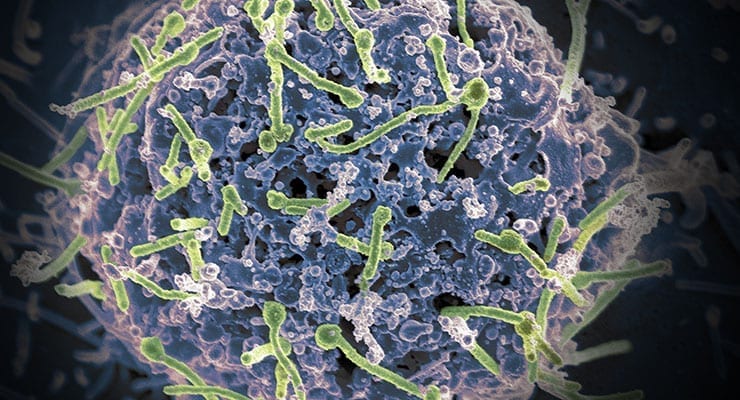A team led by Dr. Thomas Geisbert at the University of Texas Medical Branch (UTMB) at Galveston, in collaboration with Tekmira Pharmaceuticals in Vancouver, Canada, have been developing therapies that can target specific strains of the Ebola virus.
The strategy uses small interfering RNA (siRNA) molecules, short pieces of RNA designed and built with specific sequences that “interfere” with production of key proteins crucial for survival of the virus, without interfering with any processes in uninfected cells. An important advantage of siRNAs is that their sequences can be rapidly redesigned to target various strains of the Ebola virus.
The Tekmira team developed a new siRNA treatment, called siEbola-3, against the Makona outbreak strain of Ebola. Because directly administering siRNAs can cause harmful immune responses, the team encapsulated the siRNAs in lipid nanoparticles for safer delivery.
The UTMB scientists tested the lipid nanoparticle siRNA treatment in monkeys that had been exposed to the Makona strain. Animals treated 3 days after virus exposure—at which point they showed evidence of advanced disease—developed only mild symptoms and fully recovered. The animals showed less liver and kidney damage than normally occurs during an Ebola infection.
Untreated animals succumbed to the disease in a time course similar to what has been reported in patients who begin showing symptoms of Ebola.
“The candidate treatment was rapidly adapted to target the Makona outbreak strain of Ebola virus,” Geisbert says. “We were able to protect all of our nonhuman primates against a lethal Makona Ebola infection when treatment began 3 days following infection.”
The siEbola-3 agent is currently being administered to Ebola-infected patients in Sierra Leone in a phase 2 study. The researchers note that use of a blend of several different siRNAs could potentially be used to combat newly emerging viral strains.
The 2014-2015 Ebola outbreak in West Africa is the largest Ebola outbreak in history. More than 25,000 cases and 10,000 deaths have been reported. It has caused more fatalities than all previous outbreaks combined.
The work was funded by NIH’s National Institute of Allergy and Infectious Diseases (NIAID).


